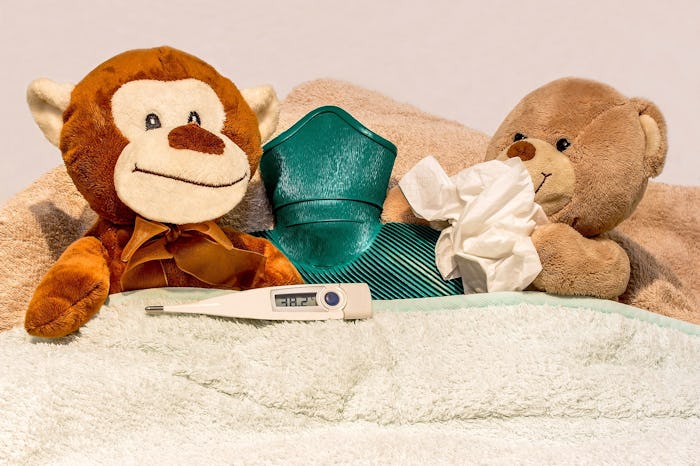Terribly uncomfortable and terribly prevalent this time of year, norovirus has wreaked havoc on schools and daycare centers alike of late, leaving a trail of sick and miserable people in its wake. The winter flu seems to infect everything it touches. So is norovirus contagious? In a word: Absolutely.
Not only can the various strains of the virus be contracted from currently sick sufferers and previously sick carriers, but it can also spread after being left on various surfaces to dry up — in other words, it can sit silent on an object's surface for up to a week, and doesn't only use human carriers to jump around. All in all, it's pretty bad news for those looking to avoid the vomit-causing and diarrhea-inducing sickness this season.
The Centers for Disease Control and Prevention (CDC) classifies norovirus as "highly contagious," noting that "you can get norovirus illness many times in your life," given that there are so many strains of the virus around. What's more, according to WebMD, these viruses "can survive temperature extremes in water and on surfaces" in addition to surviving dehydration, making them even more potent and harder to obliterate. Also, contagiousness doesn't stop when sickness does, so "you may continue to shed virus in your feces for up to two weeks after recovery," reminds the Mayo Clinic.
Those suffering from norovirus are most contagious at two points: first, "when you are sick with norovirus illness," and second, "during the first few days after you recover from norovirus illness," the CDC explains. But how (and where) does norovirus manifest?
The reality is pretty brutal and unpleasant. "You can become infected with norovirus by accidentally getting stool or vomit from infected people in your mouth," the CDC reveals. Stool and vomit lingering on surfaces, foods, liquids, and utensils can all carry the virus, which is why extreme cleanliness is key to preventing repeated infections.
Without going into too much grotesque detail, you can imagine why schools and daycare centers would be especially susceptible to outbreaks. Still, there are some key preventative measures to take within your home to stop norovirus in its tracks. First? Get used to constant hand-washing with hot water, 24/7. It's non-negotiable. Next, launder any sheets and towels used by a sick person, again, using hot water. Finally, disinfect your home using bleach. Kitchens and bathrooms especially require this type of cleaning and care. It sounds extreme, but regular household cleaners are simply not enough.
If you're currently suffering through the sickness, hold tight: Norovirus can last for one to three days. Seeing as it spreads so easily, the best move is to sequester yourself from others until it's passed. Once you're well again, be sure to follow up with some severe cleaning. You wouldn't want to keep norovirus around the house any longer than it's already been.
